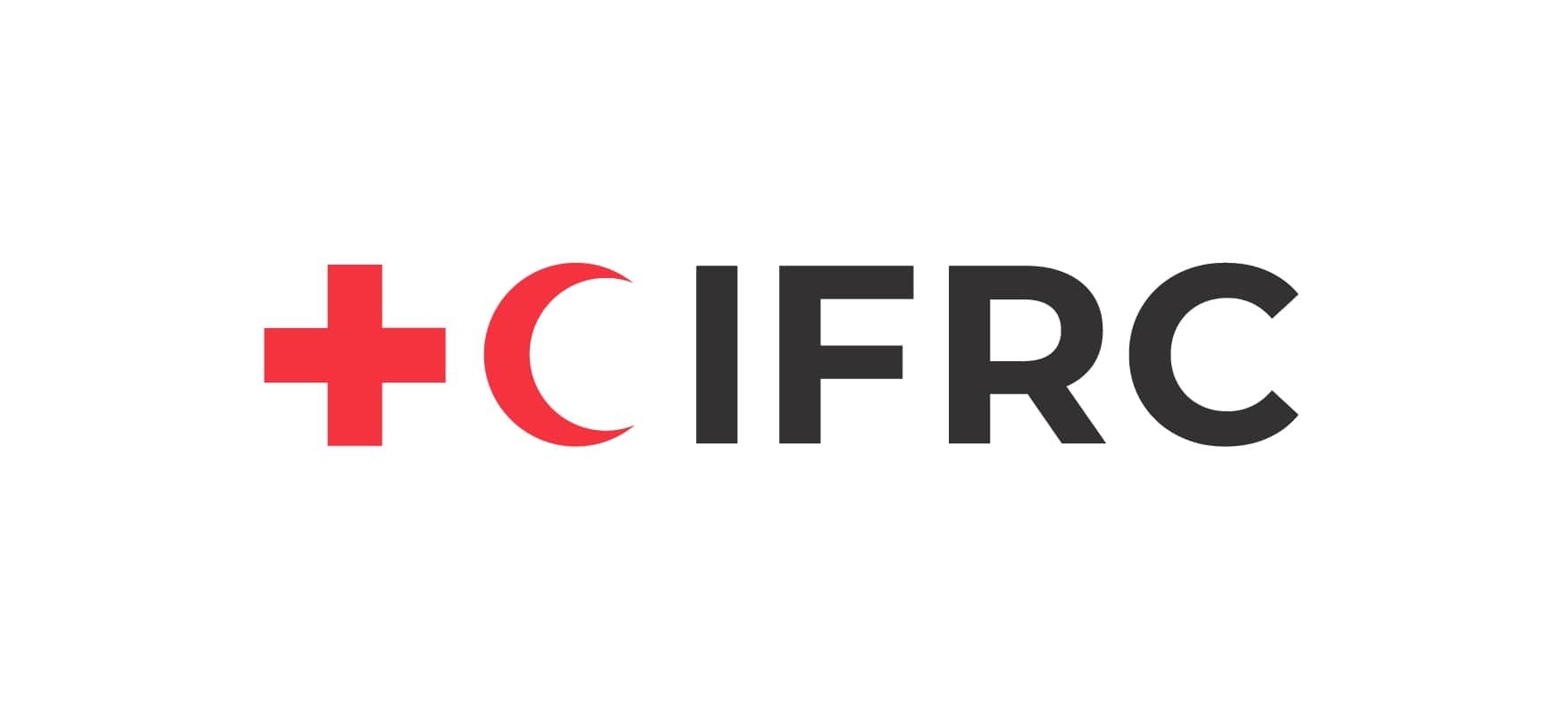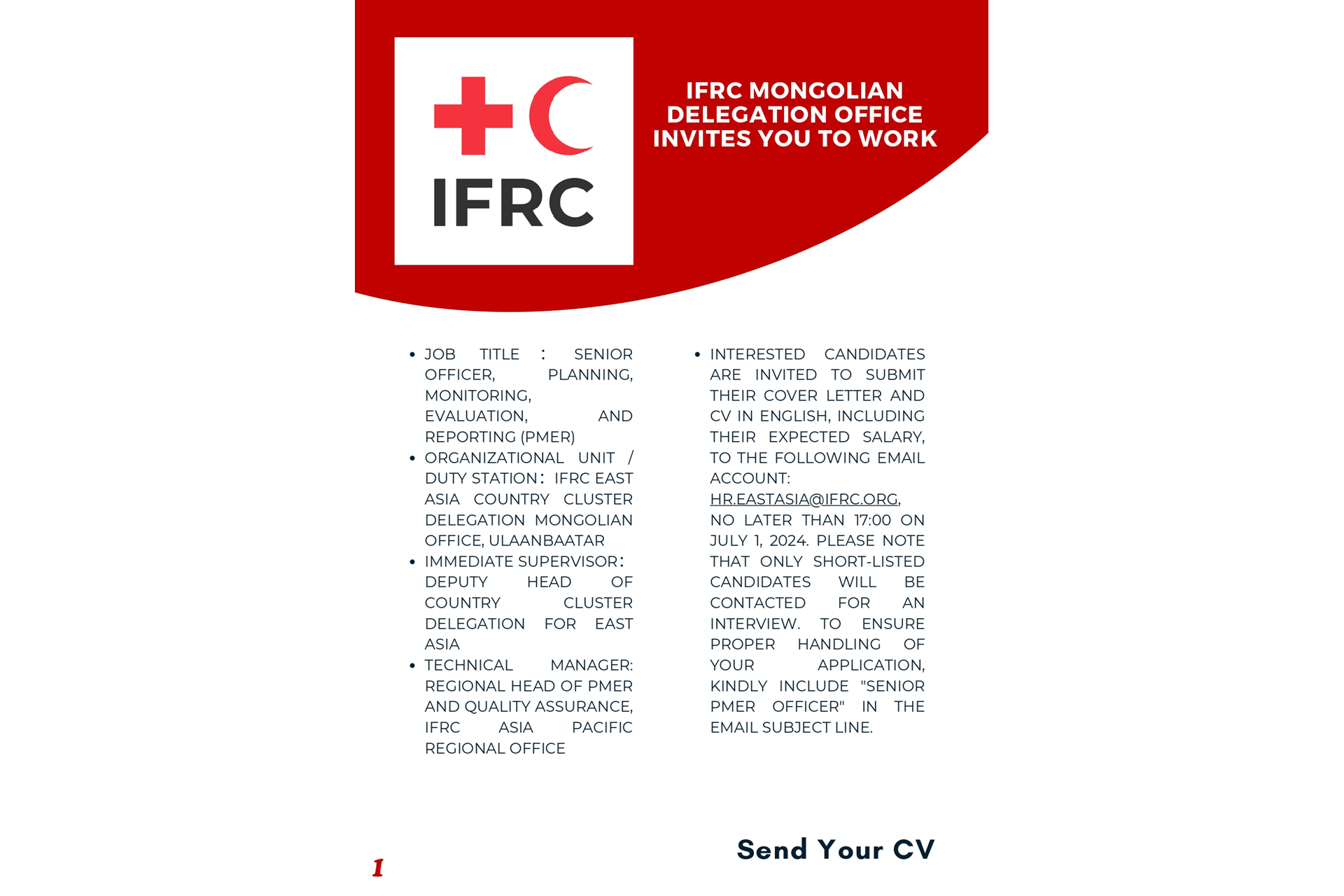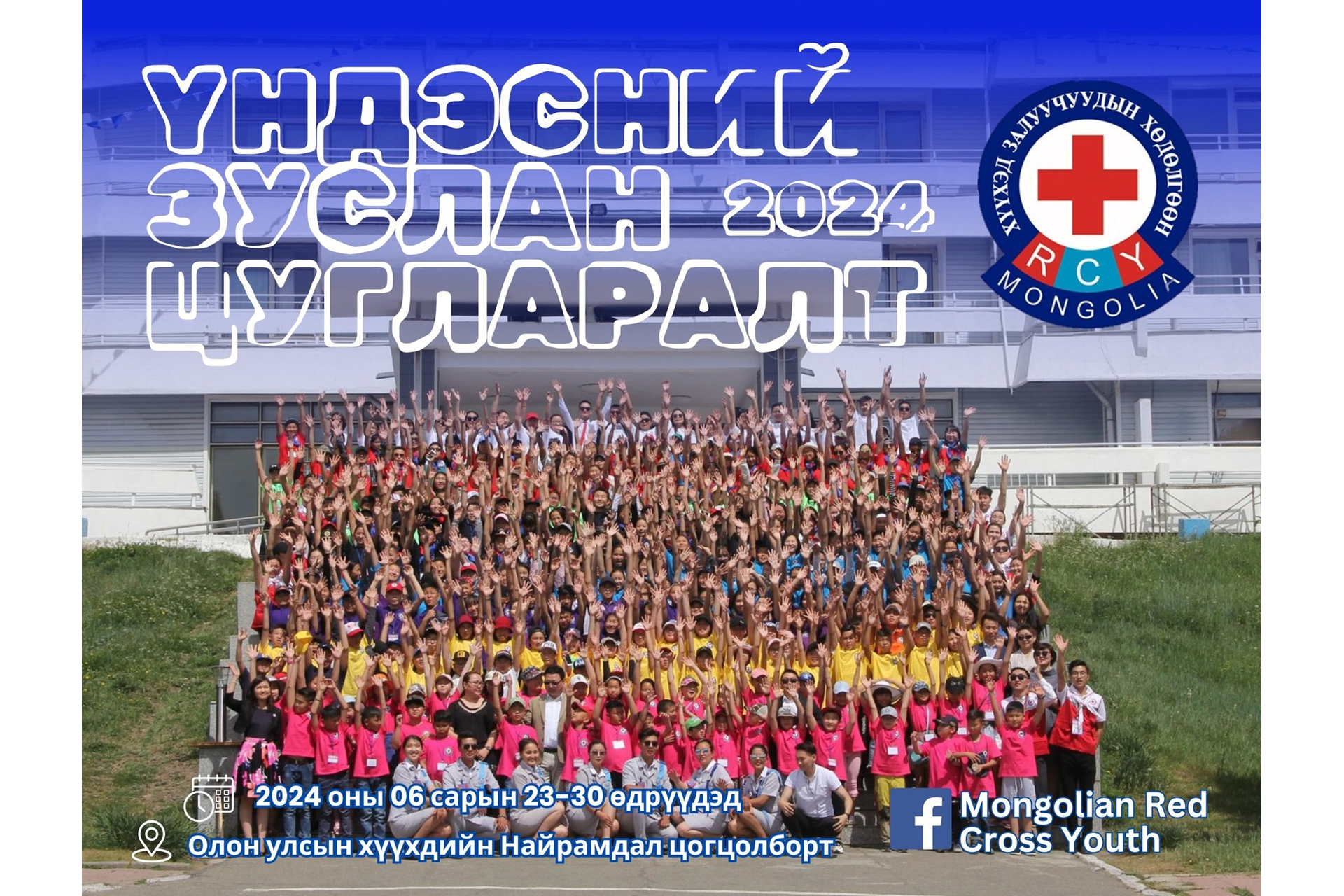
Нийтэлсэн өдөр: 2021.11.23, мягмар

Job Title: Monitoring, Evaluation and Learning (MEL) Senior Officer
Organizational Unit / Duty Station:Planning, Monitoring, Evaluation and Reporting Unit (PMER), Asia Pacific Regional Office (APRO) / Outposted to Ulan Bator
Classification Level: J
Line Manager / Immediate Supervisor:PMER Manager, APRO
Second Line Manager:Head of PRD, Asia Pacific Regional Office
Technical Manager:M&E Senior Advisor, Geneva
Number of Technical Reports: M&E focal points in delegations
Number of Direct Reports: Consultants, and potentially one programme assistant
Duration: Full-time for 1 year (with possibility of extension)
Interested candidates shall send their Cover Letter and CVs (English) with a recent photo to the following email account: hr.eastasia@ifrc.org no later than 17:00 December 7, 2021. Only short-listed candidates will be invited for an interview. Please mark clearly of the position name you applied (Sr. MEL Officer) in the subject of the email.
Organisational context
The International Federation of Red Cross and Red Crescent Societies (IFRC or “the Federation”) is the world’s largest volunteer-based humanitarian membership organisation established by and comprised of its member National Red Cross and Red Crescent Societies. The overall aim of the IFRC is “to inspire, encourage, facilitate, and promote at all times all forms of humanitarian activities by National Societies with a view to preventing and alleviating human suffering and thereby contributing to the maintenance and promotion of human dignity and peace in the world.”
It works to meet the needs and improve the lives of vulnerable people before, during and after disasters, health emergencies and other crises. The Federation is served by a Secretariat based in Geneva, with regional and country and country cluster delegations throughout the world. The Secretariat is led by the IFRC Secretary General and provides the central capacity of the International Federation to serve, connect, and represent National Societies. The Secretariat’s focus includes providing support to the IFRC governance mechanisms; setting norms and standards; providing guidance; ensuring consistency, coordination, and accountability for performance; knowledge sharing; promoting collaboration within and respect for the RCRC Movement; and expanding engagement with partners.
In Asia and the Pacific, the IFRC secretariat supports 38 National Societies, many of which have significant local and international capacities and resources in delivering the humanitarian services. The IFRC secretariat has 5 country cluster delegations (CCD) and 8 country delegations (CD) in the region.
The MEL Senior Officer will be a member of the Asia Pacific Regional Planning, Monitoring, Evaluation and Reporting Unit based in Kuala Lumpur, Malaysia. The MEL Senior Officer will be the focal person who leads/advises M&E and learnings processes and implementation in the Asia Pacific region and may from time to time be required to travel to other countries to assist (travel and safety permitting) National Societies or IFRC delegations.
Job purpose:
The overall purpose of this senior position is to support a culture and practice of reliable monitoring, evaluation and learning for the IFRC work in the Asia Pacific Regional Office. The position will provide leadership in how success and impact of programmes are defined and measured. This includes leading the improvement of existing monitoring and evaluation (M&E) systems as well as developing and coordinating new MEL systems and events within the IFRC and among its partners, building the capacity of IFRC Secretariat and National Societies in MEL, and promoting knowledge transfer.
The position will provide technical advice/expertise on MEL-related tasks and should ensure that MEL systems are in place at the Secretariat and National Societies, and are in line with the framework and guidelines for M&E, and that learnings, lessons and resources are adapted for use by the IFRC Secretariat and National Societies to build its capacity in applying new methodologies in future situations.
The position will also work closely with Geneva and other regions to influence and develop global policies and procedures that will help in measuring results globally according to best practices in evaluation.
Job duties and responsibilities
1. Serve as the Secretariat leader for MEL in Asia Pacific, defining and measuring results of IFRC and National Societies work.
2. Oversee and manage MEL implementation, capacity building and sharing of the Secretariat and different National Societies.
3. Lead the adaption or development of specific assessment, monitoring, evaluation, learning and reporting tools for consistent and quality data collection, coherent with and reinforcing Secretariat guidelines for M&E and learning.
Monitoring & Evaluation
4. Coordination within IFRC Regional Office and country delegations to ensure accurate, thorough, and useful monitoring and reporting of project activities and impacts, both internally and externally. This includes particularly close collaboration with the regional programme managers, the regional PMER Unit, and National Societies PMER/operation focal points to ensure that monitoring data is properly collected, verified and included in the reports for the project/programme/operation.
5. Lead in the monitoring of the implementation progress of operational plans in the AP region through data collected from implementation plans. This will be done in collaboration with PMER Senior Officer and IM Coordinator.
6. Collaborate and co-create with Geneva and other regions in the development of a Federation-Wide Monitoring and Reporting System to monitor IFRC’s Plan & Budget 2021-2025 with standard systems and procedures to ensure credible, reliable, timely, and cost-effective monitoring data to inform ongoing management decisions, strategic planning, and uphold accountability. The position will be responsible for roll out within the region, in collaboration with FDRS.
7. Coordination and oversee Secretariat evaluations, ensuring that they are timely, useful, and ethical, upholding the criteria and standards as defined in the IFRC Framework for Evaluation. This includes TOR preparation for and the design and implementation of programme surveys (e.g. baselines), real-time evaluations (RTE), mid-term and end of project evaluations, case studies, and other components of the M&E system as technical assistance needs arise; using a range of quantitative and qualitative methods and various participatory methodologies to monitor performance. This includes ensure learnings from evaluations to be applied in future programming.
8. Provide technical guidance to programme staff in incorporating appropriate M&E systems into projects based on needs, Secretariat and donor requirements, resources and capacities. This includes: 1) adequate needs assessment to inform relevant programming, 2) the use of project and programme logframes according to the IFRC PPP guidelines, 3) the development of SMART indicators that are supported with clear and concise indicator guidelines that define the indicators, data sources, data collection methods, frequency, and audience. This includes coordinating and supporting the implementation of the Movement/Federation-Wide Reporting System for large-scale emergency operations.
9. Routinely perform quality control checks of M&E work, overseeing the recording and reporting of progress and performance of the project/programme/operation compared to targets.
Learning
10. Lead the development of a system to ensure that lessons learned from programme and operations are used to improve future design and implementation. This includes facilitating management response processes following an evaluation/review, reflection opportunities (e.g. meetings and workshops) towards developing a strong learning culture in IFRC.
11. Organize seminars with staff and relevant stakeholders to digest lessons from analysis and to deepen reflection on achievements and failures that serve to improve programme and operation design.
12. Contribute to drafting learning papers that capture lessons from IFRC’s work in order to inform the work of the humanitarian and development fields.
13. Input into the development of IFRC’s case studies, to showcase insights and instances of success in IFRC’s work for sharing with donors and other stakeholders.
14. Liaise with external organizations to identify and disseminate good MEL practices in MEL and contribute to knowledge sharing.
Reporting
15. Support PMER unit in internal and external reporting.
Capacity Building
16. Prepare and train staff, primary stakeholders, and implementing partners, as necessary, on project and programme design, monitoring and evaluation concepts, skills and tools.
17. Network and coordinate with other external M&E/MEL/MEAL working groups and practitioners to 1) maximize the coordination and collaboration of data collection and efficient use of time and resources, and to reduce data collection duplication and the negative impact (assessment fatigue) among the target populations, 2) ensure that IFRC is kept up to date with contemporary issues and best practices related MEL, quality assurance and accountability.
18. Introduce and/or maintain MEL forums among IFRC and its stakeholders in Asia Pacific, both partners and people reached through IFRC support, to discuss and support quality programming and accountability standards.
Others
19. Perform other tasks as required.
Position Requirements
Education
• Master’s degree in social sciences or related field is required.
Experience
• Minimum of 5 years relevant international experience both in the field and headquarters in disaster relief, recovery or development work
• Minimum of 5 years in designing and implementing integrated results-based MEL systems and processes
• Experience as evaluator for disaster relief, recovery or development work. (Please include at least two evaluation reports in which you were part of)
• Solid understanding of the development sector with a focus on participatory processes, joint management, and gender issues is preferred
• Experience in coaching programme staff and facilitating training on various MEL topics
• Experience in selecting and managing consultants
• Familiarity with IFRC operating environment is preferred
Knowledge and Skills
• Solid experience in research methodology, data processing and data analytics
• Detailed knowledge of project management, log frame-based project design, Theory of Change, monitoring and evaluation
• Excellent computer skills: Advanced Microsoft Excel (and/or other statistical tool), Outlook, Word, data visualization tools (e.g. PowerBI, Tableau, etc)
• Sound communication skills and ability to assimilate and process information for wide-ranging audiences
• Demonstrated success in supporting organizational learning, accountability and performance
• Knowledge of databases and computer-based management information systems is preferred
• Strong commitment to Red Cross Red Crescent Principles, and ability to model those Principles in relationships with colleagues and partners and translate them to development practice
• Basic understanding of legal framework of humanitarian operations, as well as gender, protection, social or human vulnerability issues
• Inter-personal skills and cultural sensitivity
Languages
• Fluent spoken and written English is required
• Good command of another IFRC official language (French, Spanish or Arabic) is preferred

